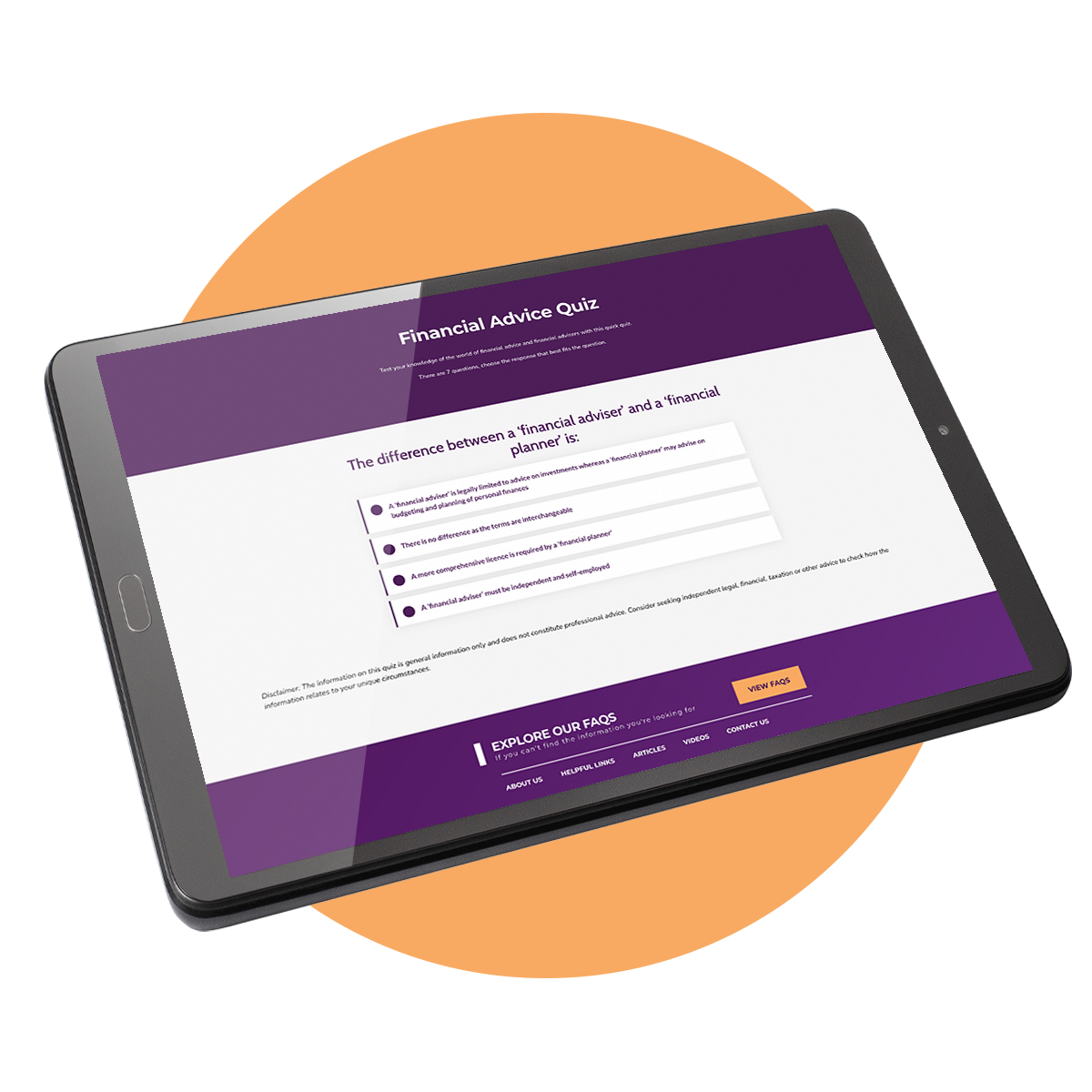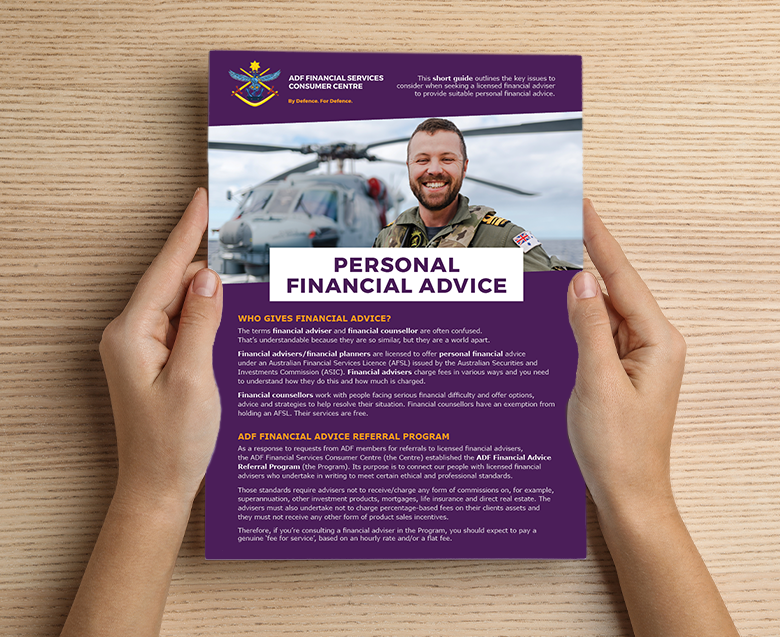GETTING FINANCIAL ADVICE
What is financial advice and do you need it? Not everyone needs financial advice but good advice can help you achieve your goals and manage financial risks for you and your family. Explore the information below to decide whether you need financial advice and learn about the process and what to expect. If you are looking for a financial adviser it’s important to find someone you can trust to act in your best interests.
What is financial advice?
Financial advice is where you seek help from a suitably qualified professional to help you make decisions about money. A financial adviser looks at your current financial position and goals and then recommends ways to achieve them.
Financial advice can help you set goals, do a budget, choose investments and superannuation, plan for retirement and advise on insurance and estate planning.
In Australia, financial advisers must be licensed by the Australian Securities & Investments Commission (ASIC), the Government Regulator, or be an authorised representative of an organisation licensed by ASIC. ASIC’s financial advisers register will tell you if an adviser is authorised to give you the type of advice you want.
Financial advice vs financial counselling
Financial advisers provide planning and investment advice, for a fee. Financial counselling is a free service by a qualified professional who can provide you with information, advice and advocacy if you are experiencing financial difficulty. If you are experiencing problems with debt or are unable to meet your ongoing expenses, visit our Immediate Money Help page.
Financial Advisers: The facts and the fiction
This video assists members in understanding how the financial advice industry works, whether financial advice is right for them, how to find the right adviser and how to avoid common traps and pitfalls.
Do you need financial advice?
Not everyone needs financial advice but good advice can help you achieve your goals and manage financial risks for you and your family. It can help you develop a road map to reach your goals and identify suitable investment options.
Financial advice may be useful at times of change in your life, like starting a family, being deployed, planning for transition or managing an inheritance. You just need to estimate whether the benefits outweigh the cost.
You may prefer to develop your own financial plan to better manage your money and our services can help you do this. However, if you’re not confident going it alone, paying for financial advice may be better than doing nothing at all.
If after completing your budget and debt summary you think you’ll have difficulty managing your debts, seek help immediately. Try not to default on your payments, talk to your credit providers to negotiate an affordable payment plan.
Poor reputation of the financial advice industry
One reason people don’t seek advice is the poor reputation of the financial advice industry in Australia. According to the Final Report of the Royal Commission into Misconduct in the Banking, Superannuation and Financial Services Industry, there are numerous instances where clients have ‘been given poor advice that has left them worse off than they would have been if proper advice had been given.’
An expensive service which leaves you worse off is not a great value proposition. So it’s more important than ever to spend some time choosing a financial adviser.

Knowledge Quiz
Take our 7 question quiz to test your knowledge on getting financial advice and understanding financial advisers. At the end, you'll receive a tailored list of resources to help you explore and fill any knowledge gaps!
Types of financial advice
There are several types of advice, offering different levels of service, depending on what you need, how much money you have and what you are trying to achieve.
General Financial Advice
General advice does not take into account your needs or personal circumstances. For example, being given information about a product you’re interested in, with no consideration of your financial goals or other factors and no actual recommendation, would be general advice.
General advice about financial products or investments can be given by someone who holds, or works for a company that has, an Australian financial services (AFS) licence. You must be told upfront that you are only receiving general advice.
Often, general advice is given for free by someone who is selling a particular financial product, such as an insurance policy. They may explain the features of the product and what the policy does and doesn’t cover, but not recommend whether you should take out the policy.
Personal Financial Advice
When someone gives you personal financial advice they should consider your particular goals and circumstances. This type of advice should only be given by a licensed financial adviser.
Personal financial advice may include:
Single-issue advice about a particular issue, for example, the best way to make personal super contributions, or how to choose a life insurance policy.
Comprehensive advice includes a comprehensive financial plan, covering all aspects of your finances, including saving, investments, insurance, superannuation and retirement planning.
Ongoing advice where your adviser offers to regularly monitor and review your financial plan. The frequency of reviews and how you pay for them should be mutually agreed with your adviser and will usually depend on the complexity of your financial affairs.
Different ways to get advice
There are various ways to get advice. The method you choose will likely be based on your needs, your preference and how much you are prepared to pay.
Face-to-face advice
This may be suitable if you are looking for comprehensive advice, have complex issues, or would be more comfortable meeting an adviser in person, assuming it is practical for you to do so.
Phone or video-based advice
This is often used for single-issue personal advice or general advice, in conjunction with a follow up email or letter. In recent years, as people have become more familiar and comfortable with working remotely, these means have also increasingly been used for personal advice. This may be particularly useful for Defence members and their families as they may not have a suitable adviser located close to where they live or work.
Robo advice
Robo advice (also known as digital financial product advice or automated advice) is computer-generated advice, usually with no or limited interaction with a human financial adviser. You enter details such as income and expenses, assets and liabilities, goals, objectives and the amount of risk you’re prepared to take, into a computer program and, based on this information, it generates financial advice.
This sort of advice is still developing and is currently more suitable for simple tasks, such as choosing appropriate investments. It relies heavily on you entering correct data and is likely to be much cheaper than using a human adviser. However, the program operator must still have an AFS licence or be a representative of an AFS licensee.
Personal Financial Advice Guide
This 2-page guide explains who financial advisers are and how to find one. It answers the most commonly asked questions we receive from members about financial advice and provides links to additional resources you can explore before consulting a licensed financial adviser.

How to find a financial adviser?
If you are looking for a financial adviser it’s important to find someone you can trust to act in your best interests. Advisers who get paid a percentage of the funds they manage for you or have incentives to sell particular products to you, have what are called ‘conflicts of interest’. This means they may be tempted to put their interests ahead of yours. We strongly recommend that you use a genuine fee-for-service adviser like those listed under the ADF Financial Advice Referral Program. These advisers will charge you an hourly rate or set fee for the work they do.
Questions to ask a financial adviser
Think of this like an interview process, where you are interviewing them. It may be useful to ask about the following:
- Remuneration – How are they paid and what exactly will they do for the money? Get an estimate of costs, including preparing and implementing the advice. Also ask about their ongoing monitoring and review service. Find out whether they charge on a fee-for-service basis (recommended), a percentage-of-assets basis or a combination of both
- Conflict free – Advisers who receive incentives for selling a particular product may be tempted to act in their own best interest rather than yours. Do they receive sales incentives, bonuses gifts or other freebies for selling you a product?
- Qualifications – Do they hold a degree qualification in a relevant discipline, like finance, economics, accounting or financial planning?
-
Experience – Find out about their typical clients to see if they have experience dealing with people with similar situations. For example, do they have experience dealing with ADF members and the unique challenges that come with a career in Defence, or with the various military super funds?
- Getting to know you – How will they go about getting a complete picture of your current situation, goals and advice needs? Advisers who don’t take the time to understand your situation properly before trying to sell you a product or course of action may be lacking in skill, diligence and/or integrity
- Adviser contact – Are you able to contact your adviser if you have any questions or concerns about your investments? If the adviser nominates a different point of contact, such as a more junior staff member, are you happy with the arrangement?
-
Current products – Find out whether they can provide advice on your current products, such as your super fund, or if they are restricted to giving advice about products on their approved product list (APL) only. A good adviser will focus on the services and strategies they can offer you, not the products they can sell you
Financial Advice Checklist
- Watch our video Financial Advisers: The Facts and the Fiction
- Decide whether you need financial advice
- Learn about the financial advice process and what to expect
-
Download our Personal Financial Advice Guide
-
Find a licensed financial adviser. The ADF Financial Advice Referral Program will help you find a genuine fee-for-service adviser
- Gather information on prospective advisers
- Understand how each adviser is paid and whether there are any potential conflicts of interest
- Choose an adviser that has the skills and experience to suit your advice needs and one you feel comfortable working with
- Decide whether you want one-off advice or an ongoing relationship
- Agree the scope of advice and fees up front
- Read your Statement of Advice (SOA) carefully and ask questions about anything you don’t understand or that doesn’t seem to be appropriate for your personal circumstances
- Implement the advice if you are happy with the recommendations
- Set yourself a reminder to review your advice each year, either with or without your adviser, to make sure it is still appropriate for your current circumstances
Frequently Asked Questions
A financial adviser, or financial planner, can help you with things like wealth creation strategies, choosing investments and retirement planning, for a (often substantial) fee.
- Identify short, medium and long-term goals
- Develop strategies to achieve your financial goals
- Better manage your money
- Develop an investment plan
- Choose tax-effective investments
- Make the most of your superannuation
- Find out if you’re eligible for any government assistance
- Work out your insurance needs
- Plan for your retirement
- Consider your estate planning needs.






